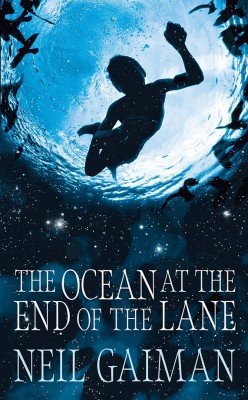Nothing said in that language can be a lie

The Ocean at the End of the Lane
by Neil Gaiman
It’s not often I read a book within 24 hours of buying it but the combination of circumstances and it being a darned good read meant on this occasion I did just that. As I mentioned on Sunday, I was lucky enough to attend a “pre-launch event” for this book on Friday and got my 30 seconds with Neil Gaiman himself, during which I, as always, failed to have anything interesting to say. By Saturday lunchtime I was reading the last page and wishing the book could have been twice as long.
There’s a sweet story behind this book, and also a very sad one (two different stories, that is). Gaiman’s wife went away for a few months last year on a tour of Australia and he missed her, so he decided to write her a short story as a kind of love letter. Not that it’s a romantic story, but it is a personal one, with a character heavily based on 7-year-old Neil and a setting heavily based on his childhood home and beginning with an incident that really did happen to his family when he was 7 years old, though his parents didn’t tell him about it at the time. Except this isn’t a short story, because he kept on writing and ended up with a novel. Which I think all Gaiman fans will be grateful for.
The un-named 7-year-old boy at the centre of this story is bookish and friendless, which is fine by him as he has his books. But the sudden and shocking death of the family’s lodger unleashes something terrible and powerful that only the three women who live in the farm at the end of the lane can possibly defend against. These are the Hempstocks – Lettie, who is 11 and has been 11 for a very long time; Young Mrs Hempstock and Old Mrs Hempstock. They resist the word “magic” but there is definitely something magical, or even mythical, about them.
“It was only a duckpond, out at the back of the farm. It wasn’t very big. Lettie Hempstock said it was an ocean, but I knew that was silly. She said they’d come here across the ocean from the old country. Her mother said Lettie didn’t remember properly, and it was a long time ago, and anyway, the old country had sunk. Old Mrs Hempstock, Lettie’s grandmother, said they were both wrong, and that the place that had sunk wasn’t the really old country. She said she could remember the really old country. She said the really old country had blown up.”
This is quite a dark story, in a fairy tale kind of way. And it gets genuinely frightening in places, as well as being happy and sad and wistful and of course funny. It touches on the different ways in which children and adults see the world, with children both missing certain things through lack of understanding but also seeing more through curiosity and not having yet built up that blasé acceptance of how things are that can blind us adults to possibility.
“I have understood what she was saying, in my dreams. In those dreams I spoke that language too, the first language, and I had dominion over the nature of all that was real…nothing said in that language can be a lie. It is the most basic building brick of everything.”
Gaiman said on Friday that he felt writing this that he was creating a myth rather than a novel and that makes a lot of sense. He also said that the Hempstocks have been characters in his head since his childhood and this book certainly doesn’t clarify who or what they are, so I wouldn’t be surprised if they turn up again.
Published 2013 by Headline.
Source: Bought from Topping & Co at their author event on 14 June.
Sounds good! Not clear whether it’s a book for adults, but I think so? I asked for a review copy and looking forward to reading it.
Does Gaiman still look like a rock star? 🙂
Judith Like a classic rocker, maybe! The book’s mythical quality means it could be read by children or adults, I’d say.
Amazing book – mythic and beautiful, but on a very human scale.
This was a Christmas present, partly bought for me based on your review, so thank you!